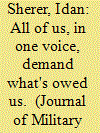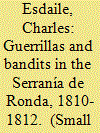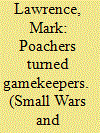| Srl | Item |
| 1 |
ID:
133127


|
|
|
|
|
| Publication |
2014.
|
| Summary/Abstract |
This article examines the main characteristics of mutinies in the Spanish tercios at the height of the Italian Wars (1494-1559), a surprisingly under-researched subject considering the high frequency of such upheavals in these core infantry units. Contrary to the severe legal and moral implications of modern military mutinies the dynamics of the mutinies in the tercios resembled more closely those of a modern workers' strike, in that the soldiers were allowed room to organize, make representations, negotiate and reach relatively amicable conclusions. Generals and soldiers alike accepted the recurring mutinies as a way of maintaining the organizational status quo in a context of infrequent paydays and persistent supply problems.
|
|
|
|
|
|
|
|
|
|
|
|
|
|
|
|
| 2 |
ID:
133515


|
|
|
|
|
| Publication |
2014.
|
| Summary/Abstract |
The Spanish Guerrilla (1808-1812) which has given its name to ideologically motivated insurgencies is usually portrayed as a patriotic uprising against the French occupation forces of Napoleon. It was that, in part, but also many other things besides. This case study illustrates its overlap and convergence with banditry but also with social unrest turned into uprisings directed by poor Spaniards against their creditors, as in the storming of Ronda by insurgents in 1810. From the propaganda of the day to the subsequent Spanish patriotic historiography, there has been a tendency to exaggerate the amplitude of events and also the damage that was done to the French forces and the casualty figures inflicted on them.
|
|
|
|
|
|
|
|
|
|
|
|
|
|
|
|
| 3 |
ID:
133517


|
|
|
|
|
| Publication |
2014.
|
| Summary/Abstract |
This article modifies the associations made by historians and political scientists of Spanish guerrilla warfare with revolutionary insurgency. First, it explains how the guerrilla phenomenon moved from a Leftist to a reactionary symbol. Second, it compares the insurgency and counter-insurgency features of the Carlist War (1833-1840) with those of the better-known Peninsular War (1808-1814). Third, it shows how erstwhile guerrilla leaders during the Carlist War made their expertise available to the counter-insurgency, in a socio-economic as well as military setting. This article revises the social banditry paradigm in nineteenth-century Spain in the under-researched context of Europe bloodiest nineteenth-century civil war.
|
|
|
|
|
|
|
|
|
|
|
|
|
|
|
|